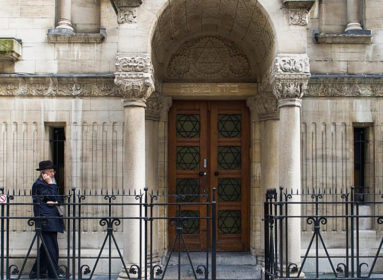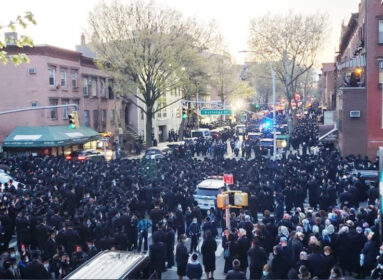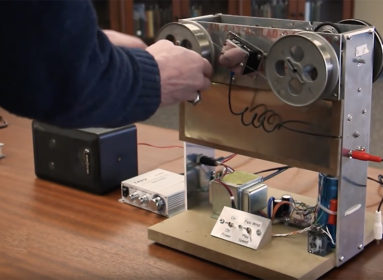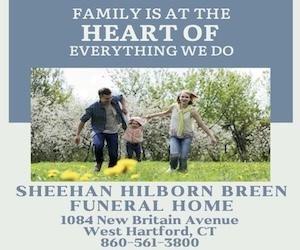Protecting human health and the diversity of life is a value emphasized in Torah, Talmud, and rabbinic literature throughout the ages—beginning with the commandment in Genesis for Adam and Eve to serve and protect the Garden of Eden. Three new efforts in the greater Hartford Jewish community link Jewish values with sustainable solutions. Given that Earth Day will be marked nationally on Friday, April 22, we thought this would be the perfect time to highlight these efforts…and inspire others.
Jewish Local Greens is a cross-denominational, cross synagogue group in West Hartford
Jewish Local Greens brings together sustainable agriculture and Judaism
A new project, Jewish Local Greens, is bringing the mitzvah to Greater Hartford in collaboration with a Jewish educational farm. The result: Jewish Community Supported Agriculture. Jewish Local Greens is a cross-denominational, cross synagogue group in West Hartford that had formed to purchase produce shares from Adamah, the largest Jewish educational farm in the region. This is the first Jewish CSA Community Supported Agriculture in the area.
Adamah, Hebrew for “earth,” is located at the Isabella Freedman Jewish Retreat Center in Falls Village, Conn. and is the largest educational Jewish farm in the U.S. Adamah works to connect people to their roots – to the land, to community, to Judaism, and to themselves – by providing educational programs and products in order to build a more sustainable world.
Adamah is affiliated with Hazon, Hebrew for “vision,” the largest Jewish environmental group in the U.S. One of the organization’s projects is to help Jewish communities create CSAs, an endeavor that has been recognized by Michelle Obama as the largest faith-based CSA program in North America.
CSA describes a relationship between small farmers and their communities. Individuals purchase a season’s worth of produce in advance, which provides the farm with start-up capital and a guaranteed market. This arrangement helps ensure the survival of small farms, and provides local communities with high-quality, fresh produce.
In a Jewish CSA, members not only establish the commercial relationship with a farmer, but also have an opportunity to learn how farming and local food relate to Judaism and Torah values. Jewish Local Greens and Adamah will create educational programs both at Isabella Freedman and in the greater Hartford Jewish community. The idea came about when Davida Ginsberg of West Hartford participated in the Adamah Fellowship at the Isabella Freedman Jewish Retreat Center. A three-month leadership training program for Jewish young adults in their 20s, the fellowship integrates organic farming, sustainable living, Jewish learning, community-building, and contemplative spiritual practice.
Adamah had been partnering with a CSA farm in Westchester, N.Y. and wanted to work with Jewish communities closer by. Davida returned to her native West Hartford and recruited her mother, Elaine Shapiro, to help coordinate a project, gathering interested people from area synagogues. Elaine became part of the four-member core group serving as liaisons between Adamah and the Jewish community. Other members include Mo Hart, Judy Brenner, and Maggie Cohen.
In late winter, CSA members purchase a share of the farm’s produce. Every Thursday from 4 to 6:45 p.m. for 22 weeks from early June to late October, the farm will bring the vegetables to a drop-off location in the Mandell JCC of Greater Hartford, where members will pick up their vegetables. Once a month, the farmers will set up a market at the JCC with produce, pickled items, and goat-milk products. _As part of the CSA membership, each member will work three two-hour shifts during the season.
A share includes a diverse range of organically grown vegetables and is designed to provide enough vegetables for a family of four for a week. Each share costs $600, about $30 per week, which is below wholesale rates. Shares may be split between two or more participants. A one-time membership fee of $50 enables Jewish Local Greens to join Hazon, network with other Hazon CSAs, receive expert advice, and create programs.
Membership is limited to 40 shares, and organizer Elaine Shapiro says that there are still spaces available. Registration will close on Apr. 22, but there are many other opportunities to participate in Jewish Local Greens. Info/registration: whcsa11@gmail.com
For more information on Adamah: www.isabellafreedman.org/adamah
For more information on Hazon: www.hazon.org
––––––––––––––––––––––––––––––
The Kostin family of West Hartford has created the Jessie’s Community Gardens project
New community garden project fosters tikkun olam
Jessica Kostin was only 26 when she died suddenly and unexpectedly last August. An avid chef whose passion was kosher cooking using fresh, locally sourced ingredients, Kostin’s memory will now live on in a unique community project that combines her talents with the Jewish obligation to feed the hungry and the stranger.
The Kostin family of West Hartford has created the Jessie’s Community Gardens project, and will fund each garden, with the understanding that at least 50 percent of the produce will be donated to a food service or food bank that supports the needy.
The initial garden is being installed this spring on the grounds of the Jewish Federation of Greater Hartford, close to the kosher food pantry of the Jewish Family Services of Greater Hartford, a beneficiary agency of the Jewish Federation. Open to anyone in need, the pantry serves 16 towns in the Greater Hartford area, and has seen a 1200-percent rise in clientele since the economic downturn. “Fresh vegetables are not readily available to the people the pantry serves, but we are going to change that,” wrote Jessica’s parents, Dane and Michelle Kostin, in a thank-you letter to donors.
The second garden will be installed on the grounds of the Kostins’ congregation, Beth El Temple, on Sunday, May 1, followed by a third on the grounds of Hebrew Healthcare in West Hartford. Up to 15 gardens are planned throughout the Greater Hartford community.
“At Beth El, we are involving our congregational community in a wide variety of ways, including core volunteers to build, plant, harvest, and maintain the garden,” says project co-chair Dan Kulakofsky, “We are also looking to involve our religious school and already have our first student who is developing a bar mitzvah ‘mitzvah project’ involving the garden. We are also actively working to engage our USY and Yachad communities.”
Kulakofsky says that the Jessie’s Community Gardens project will allow each participating group a good deal of freedom in determining how it would like to be involved. All groups will be expected to follow the Kostins’ guidelines: to ensure that the focus of Jessie’s Community Gardens remain on food justice, providing fresh vegetables to the hungry who often lack these essential foods, and to build bridges within and outside the Jewish community through generosity and a commitment to core Jewish values.
For more informati
on on Jessie’s Community Gardens, contact area coordinator Judy Brenner: jkbrenner03@hotmail.com / (860) 523-1762
––––––––––––––––––––––––––––––
Anything that uses a cord or battery can be ‘e-cycled'
Electronics recycling day at Beth El
WEST HARTFORD – Beth El Temple’s T’Green Olam Committee and Men’s Club host their first e-recycling day on Sunday, May 1, from 8:30 a.m. to 12:30 p.m., in partnership with Green Monster e-Cycling of West Hartford.
“Anything that uses a cord or battery can be ‘e-cycled,’” says T’Green Olam chair David Brandwein – old computer parts, small electric appliances, electronics like TVs, VCRs, and stereos.
Brandwein got the idea from a similar drive held at Temple Beth El in Springfield, Mass. “Most people are concerned about throwing things in the trash that can’t be there,” says event co-chair Lonni Schulz. “Towns and municipalities are starting to accept these things at their facilities, but many are only open during the week while people are at work, and on Shabbat, so we decided that Sunday morning is a good option.”
Fees in cash or check made out to Beth El Temple are $18 per car-full and $10 per each additional TV. Acceptable items include anything that uses a cord or batteries: TVs; computer monitors, terminals, mainframes, laptops, keyboards, CPUs, mice, cables, printers, scanners, modems; toner cartridges, ink-jet cartridges; iPods, PDAs, MP3 players, fax machines, video game consoles and controllers, cellphones, telephone PBX, camcorders, VCRs, DVD players, stereo components, radios, ups backups, dehumidifiers, air conditioners, medical equipment, lab equipment, test equipment, vacuum cleaners, electric razors, kitchen mixers, fans, snow-blowers, leaf blowers, as well as the cords and batteries themselves.
Non-acceptable items include light bulbs of any kind, household chemicals (used motor oil, lawn and garden chemicals, paint, hazardous waste), large appliances (refrigerator, washer, dryer, dishwasher, freezer, etc.).
Schulz advises that, while a popular idea, there are no current plans to make the event an annual one, so the community is encouraged to participate this year.
For more information: Lonni Schulz, (860) 651-0072 / LonniSchulz@sbcglobal.net.








 Southern New England Jewish Ledger
Southern New England Jewish Ledger










